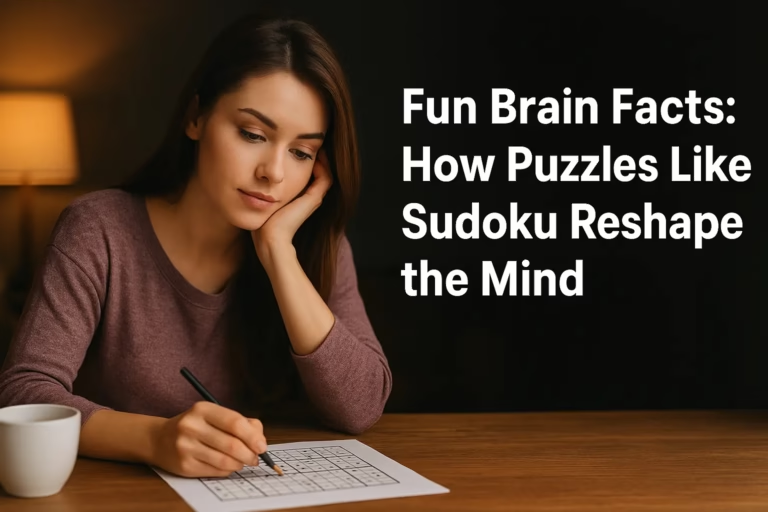When Puzzles Quiet the Chaos
One rainy evening, Mira sat hunched over a Sudoku grid, pencil tapping in rhythm with her thoughts. The world outside was loud — messages, notifications, endless noise — but here, in a quiet 9×9 world of logic and order, everything made sense.
That moment — when the final number fell into place and her brain sighed in relief — wasn’t random joy. It was neurochemistry.
Every puzzle we solve changes us, subtly but persistently. And that’s where this new “Fun Brain Facts” series begins.
Each week (or month), we’ll explore how puzzles — from Sudoku to Strands-style word games and Cryptograms — don’t just entertain us but reshape the way we think, focus, and remember.
1. The Brain’s Love Affair with Patterns
Human brains crave order. Chaos makes us anxious; structure calms us.
When you play Sudoku, your prefrontal cortex — the brain’s decision-making centre — works to impose structure on uncertainty.
That’s why completing a grid feels like mental alignment: each digit placed satisfies the brain’s deep need to resolve dissonance.
Studies from cognitive neuroscience show that structured logical puzzles increase working memory and executive control — the same mental skills you use when planning, reasoning, or learning new material.
So the next time you solve one, remember — your brain isn’t wasting time. It’s rehearsing clarity.
→ Try a fresh daily puzzle: Play Sudoku
2. The Science of the “Aha!” Moment
That sudden flash when everything clicks — psychologists call it the insight effect.
During that moment, your brain releases dopamine, a neurotransmitter associated with pleasure, learning, and motivation. It’s the same burst you feel when you hear your favourite song or finally recall a forgotten word.
Puzzles like Strands trigger this effect repeatedly.
Each hidden word discovered delivers a small dose of dopamine, reinforcing the joy of discovery. Over time, these micro-rewards can train your brain to stay longer in problem-solving mode, even beyond games.
It’s one reason puzzle solvers often have higher cognitive endurance — they’ve trained their reward systems to value focus over distraction.
3. Sudoku vs. Strands vs. Cryptogram — Different Workouts for the Same Brain
Just like different workouts train different muscle groups, each puzzle type strengthens unique cognitive circuits.
| Puzzle Type | Primary Brain Function | Psychological Benefit |
|---|---|---|
| Sudoku | Logical reasoning, pattern recognition | Enhances working memory and sustained focus |
| Strands / Word Games | Language association, creative recall | Boosts verbal fluency and cognitive flexibility |
| Cryptogram | Problem solving through hypothesis testing | Strengthens analytical reasoning and linguistic decoding |
Regular practice across different puzzle types creates balanced cognitive resilience — a brain more adaptable, curious, and creative.
→ Exercise your decoding skills: Play Cryptogram
4. What Puzzles Really Improve (and What They Don’t)
You’ve probably heard claims that puzzles “make you smarter.” That’s partly true — but with nuance.
Research shows that puzzles lead to near transfer: you get better at the specific type of thinking you practice.
For instance, Sudoku improves abstract reasoning and working memory, while word puzzles enhance verbal processing.
However, “far transfer” — becoming smarter in unrelated skills — is limited.
What puzzles do teach exceptionally well is meta-thinking: learning how to learn, managing frustration, testing ideas, and celebrating progress. Those are the very skills that power creativity, research, and problem-solving in real life.
5. Neuroplasticity: The Long-Term Benefit
Every time you solve a puzzle, neurons fire together — and, over time, wire together.
This is the essence of neuroplasticity — your brain’s ability to reorganize itself through experience.
Engaging with puzzles regularly has been shown to build cognitive reserve — the brain’s protective buffer against age-related decline.
The takeaway? You’re not just passing time. You’re building mental infrastructure.
To maximise this effect:
- Alternate puzzle types to challenge different circuits.
- Increase difficulty gradually.
- Combine puzzles with good sleep and balanced rest — memory consolidation happens offline.
6. Puzzles, Flow, and the Calm Mind
Why do we feel peaceful after solving something complex?
Psychologist Mihály Csíkszentmihályi called this the flow state — total immersion in a meaningful challenge.
Puzzles are an ideal flow trigger: clear rules, immediate feedback, complete control.
For many, fifteen minutes with a Sudoku grid or a Strands puzzle acts like mental meditation.
When attention fully absorbs in logic or language, the brain quiets the noise of unfinished thoughts and background stress.
That clarity can carry over long after the puzzle ends — improving productivity, emotional stability, and creativity.
7. The Social Brain and Puzzle Communities
Puzzles are often solitary, but solving them isn’t truly lonely.
Comparing scores, discussing logic chains, or sharing solutions taps into the social reward system of the brain.
This small but powerful loop of challenge and recognition keeps solvers returning — not just for the puzzles, but for the sense of shared growth.
That’s why this series will also invite your input — through polls, discussions, and shared reflections on how puzzles affect your thinking.
The Smallest Game, The Biggest Change
Every grid you solve, every word you uncover, every cipher you crack — it all counts.
Puzzles give structure to thought and rhythm to reflection. They remind us that clarity isn’t accidental; it’s built, one small decision at a time.
So, as you play your next round on SudokuPuzzleHub.com, know this: you’re not just solving a puzzle. You’re rehearsing how to think better — and how to stay curious, one grid at a time.



